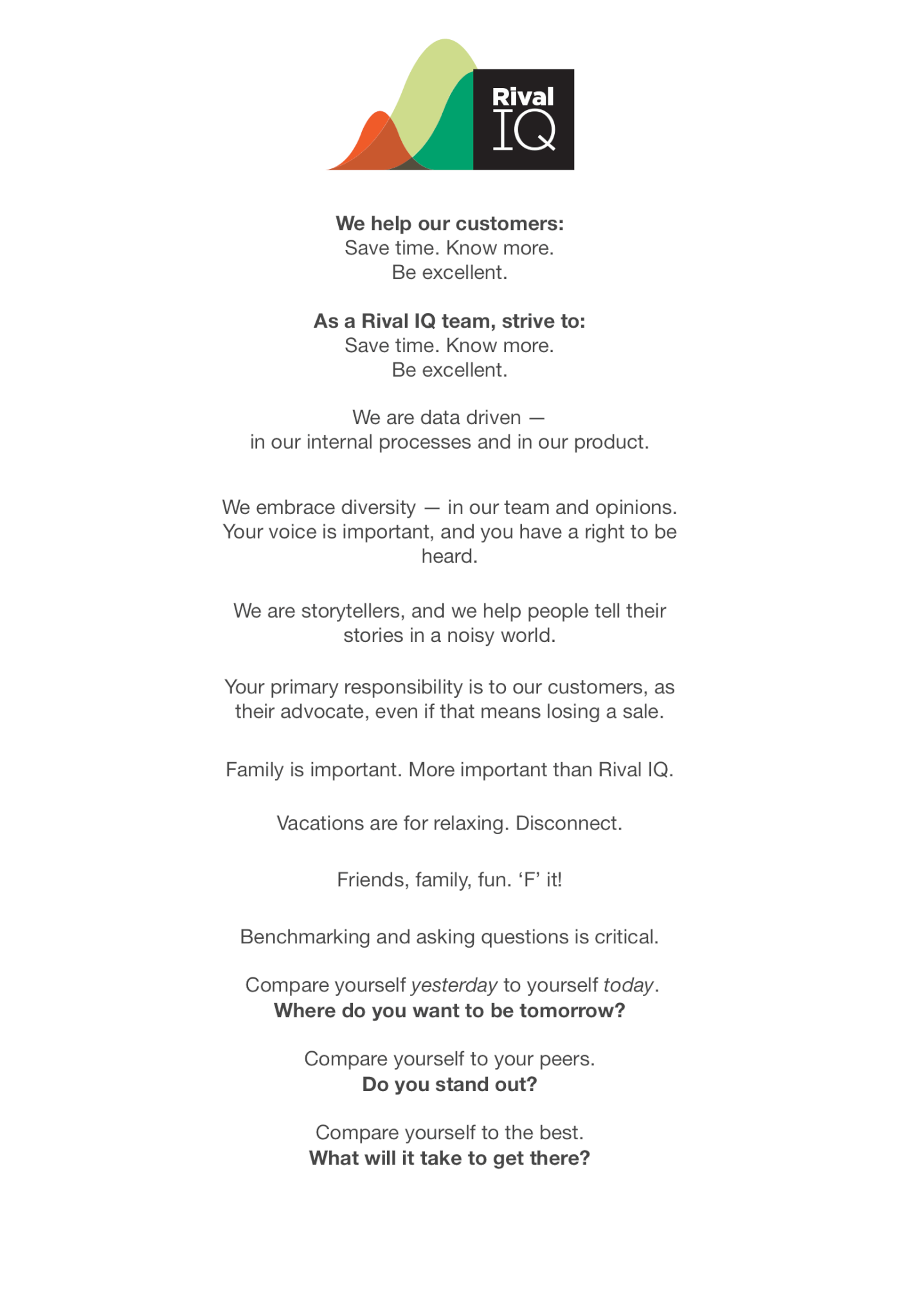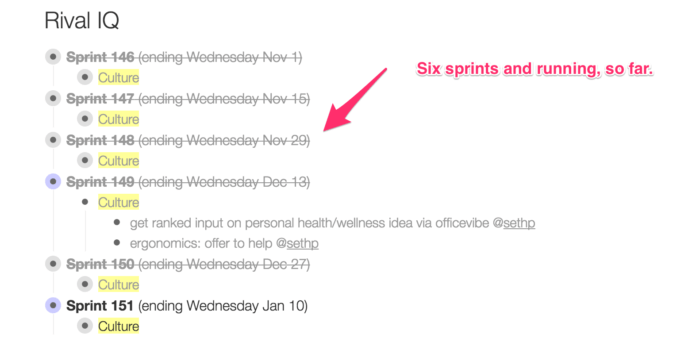There are a ton of motivational quotes on the web about not looking backward. I’ll spare you the list, and just tell you that I disagree with the notion.
In fact, I find retrospection an incredibly useful exercise when done with a thoughtful, critical mindset. If you believe there is always room for improvement, then looking back always provides fertile ground. No matter if we’re examining recent events or an entire year, retrospection is important part of how we operate at Rival IQ.
When I look back at this last year, I’m proud of a number of our accomplishments. Of course, what we achieved didn’t come without struggles. No matter how good you think you are, executing well is hard. Stopping to reflect on all of the major areas of your business will surely reveal places for improvement.
I could go through every area of our business and offer countless places where our execution was subpar. We shipped some fantastic features this year, but each one took longer to get to market than we thought. We wrote a ton of great content, but we completely underinvested in distributing what we created. To make matters worse, we doubled down on a go-to-market strategy that clearly wasn’t working.
As much as we got wrong this past year, none of these failures to execute bother me that much. After all, everything is more clear in hindsight. We’ll live to fight again another day (or year).
But you only get to keep playing the game if your team wants to keep playing with you.
People Make Your World Go ‘Round.
One of the hardest things about creating a business is building a team of people that you can trust to realize your vision. Sure, finding talented people is hard, but building a team doesn’t stop with recruiting.
Building a happy, productive team requires ongoing investment – providing constant opportunities for leadership, growth, and recognition. A company that can establish and maintain a culture that values its people has a much better chance of being successful.
At Rival IQ, we’ve always prided ourselves on our culture. We strive to be transparent and to deliver context. We try to provide our team with opportunities and support to make things happen. In general, I think we’ve done pretty well over the last five years.
But, at some point in the last year or so, I believe we started to take our culture for granted.
At about 20 people, we’re too small for a dedicated HR pro, so we’ve made do with our CEO handling the necessary items – payroll, benefits, offer letters, etc. In our weekly leadership meetings, we have sales, marketing, product, and engineering – the gang’s all here.
Except, we were missing someone at the table – the consistent voice of People and the consistent voice of Culture. And, that’s not to say that we weren’t thinking about those things here and there. But, we weren’t being proactive, and we weren’t treating our culture as something that requires consistent focus and energy.
After a few well-loved members of our staff departed for other opportunities last year, it finally hit us. We weren’t actively investing in our culture in the same way we were other areas of the business. And yet, our people are our most precious asset. What were we doing?!
So, what happened?
We were taking the culture we had at 8 people, and we were assuming it would just “be the same” at 20 people. We were wrong. Doubling your company, at almost any size, is going to change the team dynamics.
We let some of our values get violated by processes or beliefs of our growing team. As founding leaders, we failed to call bullshit when we saw it happening.
Here’s the funny thing: we try to live our values every day, but we don’t really talk about them all that much. We did write them down once, and I just found the document. The last updated timestamp is from four years ago. That’s called taking things for granted.

Since I dug out the file, let’s have a look. Reading through what we wrote down four years ago, I still agree with all of it. I am surprised that we didn’t write down the thing that we actually are doing well with: transparency within the team. (Also, please note our amazing logo color scheme from 2014.)

Our Rival IQ Values Document, circa 2014
So, what are you doing about it?
Now that the self-flagellation part of the post is over, I know the question can only be: so what are you doing about it now?
First, we leaned into our value of transparency, and we talked about how we’d failed with the team, both as groups and individuals. There is something very powerful about sitting with people, admitting failure, and talking about ways to improve. It’s the only way to build trust within an organization.
Second, we added Culture to our team-wide sprint planning process as an area of ownership. That means that every two weeks, when we sit down as a team, our culture is getting just as much airtime as product and sales. My co-founder Seth Pollack is leading this charge, and I know we’re in good hands.
Not that you need proof, but here’s a look at our sprint planning Workflowy. We’ve been at it for 12 weeks, and it has led to a few good outcomes so far. Side note: sprint 151?!?! That’s 151 * 2 / 52 = a long time.

Third, we’ve started using Officevibe to collect regular, anonymous feedback from our team. In the (distant) past, we used TinyPulse, but we failed to keep it up. We had a human in the review/sharing loop, and we let busy overtake important.
I love Officevibe because it delivers both positive feedback and highlights areas of concern in a timely manner. It integrates with Slack, so using it is seamless for the entire team. As a leadership team, we get real-time input from the team, and seeing those words is powerful and inspiring. And the metrics we get let us see where our employees think we have the most room to grow: for us, wellness and opportunity for growth.
To 2018 and Beyond!
I want a lot to happen for our company in 2018: revenue growth for our business and continued improvement of our product. I want our customers to be successful because of the value we provide to their marketing organizations. For myself and my team, I want to develop as a leader and to learn to make better decisions more quickly. Certainly, I’ll work as hard as I can to provide the guidance our team needs to ensure we realize our goals.
But more than I want any of those things, I want each member of our team to grow personally and professionally. The biggest part of making that happen, for me, is ensuring we continue to focus energy on making Rival IQ one of the best workplaces any of us have ever experienced.
That’s a goal worth working hard for. Happy New Year.
